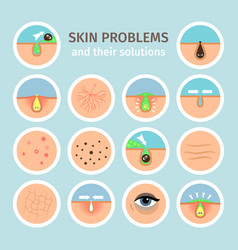Misconceptions And Truths Concerning Acne: Debunking Common Misconceptions
Misconceptions And Truths Concerning Acne: Debunking Common Misconceptions
Blog Article
Material Writer-McConnell Powers
You could assume that enjoying chocolate or oily foods is the source of your acne, however that's just among lots of misconceptions swirling around this common skin problem. As a matter of fact, acne mostly originates from clogged hair follicles, not your last treat. Misconceptions like these can lead you to adopt ineffective skincare practices that might also worsen your circumstance. As you navigate the facts behind acne, you'll find understandings that could transform your approach to skincare and assist you accomplish more clear skin. So, what really exists beneath the surface?
Common Myths About Acne
When it comes to acne, many people believe in usual myths that can bring about complication and disappointment. One widespread misconception is that consuming chocolate or oily foods creates acne. While diet plan can affect skin health and wellness, the direct web link in between specific foods and acne isn't as precise as many assume.
Another common misconception is that you should scrub your face strongly to clear outbreaks. In reality, aggressive scrubbing can aggravate your skin and get worse acne.
You might also believe that acne only affects teenagers, but grownups can experience it too, usually due to hormone modifications or stress and anxiety. Some individuals assume that sun tanning can clear up acne, however sun direct exposure can actually lead to skin damage and get worse breakouts over time.
Lastly, many think that utilizing severe products will certainly get rid of acne rapidly. Nevertheless, these products can strip your skin of its all-natural oils, resulting in raised inflammation and even more breakouts.
Scientific Facts Behind Acne
Comprehending the clinical facts behind acne can empower you to tackle this usual skin disease better.
Acne occurs when hair follicles become obstructed with oil, dead skin cells, and germs. This process frequently starts with an overproduction of sebum, the oil your skin naturally produces. Hormonal changes, specifically throughout the age of puberty or menstrual cycle, can trigger this excess oil.
Microorganisms called Propionibacterium acnes grow in these stopped up pores, leading to swelling. When your immune system responds, it can trigger redness and swelling, causing those pesky pimples or cysts.
Genes additionally play a role; if your moms and dads had acne, you may be more prone to it.
Diet and anxiety degrees can affect acne too, but research study is still evolving in these areas. While delighting in oily foods won't directly create breakouts, a balanced diet plan can support your skin wellness.
Furthermore, handling anxiety can minimize hormonal changes that might aggravate acne.
Tips for Managing Acne
Managing acne successfully calls for a mix of day-to-day skincare habits and lifestyle adjustments. Start by developing a constant skin care regimen. Cleanse your face twice a day with a gentle, non-comedogenic cleanser to remove dirt and excess oil. Avoid rubbing too hard, as this can irritate your skin and aggravate acne.
Next, integrate items having salicylic acid or benzoyl peroxide to aid protect against outbreaks. Always follow up with a light-weight, oil-free moisturizer to keep your skin hydrated. Don't fail to remember sun block; choose non-comedogenic choices to safeguard your skin from UV damage without clogging pores.
Beyond skin care, take note of your diet plan. top rated beauty and med spas with 5 star reviews and greasy foods, and concentrate on fruits, vegetables, and whole grains. Remaining hydrated is vital, so drink lots of water throughout the day.
In addition, manage anxiety via activities like yoga exercise, meditation, or exercise, as stress and anxiety can cause outbreaks.
Last but not least, avoid selecting or popping acnes. This can lead to scarring and additional swelling. If your acne persists, get in touch with a dermatologist for tailored treatment options.
https://seeninthecity.co.uk/2021/10/08/cosmetic-surgeries/
In conclusion, it's vital to separate truth from fiction when it involves acne. By disproving common misconceptions, you can much better comprehend your skin and make notified selections for your skin care routine. So, why continue to rely on out-of-date ideas when the truth can encourage you? Welcome much healthier routines, focus on gentle cleaning, and keep in mind that handling acne is a trip. With the best knowledge, you're one action closer to clearer, much healthier skin.
